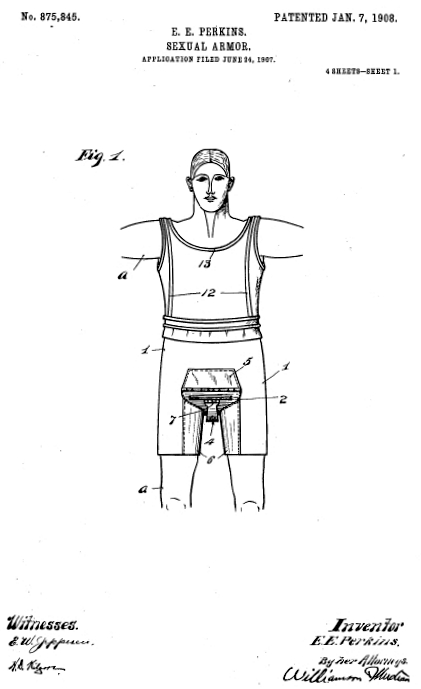Famous Beaver Bay Invention: Sexual Armor
The Green Door, a liquor store and bar in Beaver Bay, has a framed tribute to Ellen E. Perkins. She was the inventor of “certain new and useful Improvements in Sexual Armor.”
The account on the wall of the bar reads:
Surprisingly enough, the sexual armor invented by Ellen E. Perkins of Beaver Bay, Minnesota is not for defense against assault but to keep the wearer from playing with himself. In her 1908 patent she calls the practice that the garment is designed to prevent one of the most common causes of insanity, imbecility and feeblemindedness – especially in youth – and equally true of both sexes. Her profession, by implication nursing, had made her very familiar with the subject.
The armor proper is attached to a cloth garment like an armless, short-legged bathing suit. The crotch portion is a rigid metal arch plate with a lock that, when necessary, an attendant can open with a key. Liquid may be passed without unlocking the armor.
“In actual practice,” says the inventor, “I have found that an armor or device of the character described, when properly made and fitted to a patient, may be worn with very little, if any, discomfort and that when properly covered by over garments the fact of its application will not be noticeable.”
It’s patent no. 875,845, granted Jan. 7, 1908. Here’s the full image of Fig. 1 from the patent application:

A quote from the patent application:
Physicians, and more particularly physicians, nurses and attendants associated with insane asylums, have long found this habit (‘masturbation or self abuse’) the most difficult of all bad practices to eradicate, because of the incessant attention required of them in respect to the subjects in their care. In fact it has been found practically impossible to give to any such unfortunate person that constant personal attention which is, under heretofore tried methods of treatment, necessary to accomplish the redemption of such persons from such habits. Therefore, with persons who have carried on such disastrous practices until serious ailments of the mind have resulted, there has been but little hope of cure. These are all facts too well known by persons whose professions have made them familiar with this subject.
Recommended Links:
Leave a Comment
Only registered members can post a comment , Login / Register Here














4 Comments
udarnik
about 15 years agoBad Cat!
about 15 years agoBarrett Chase
about 15 years agoTodd Gremmels
about 15 years ago